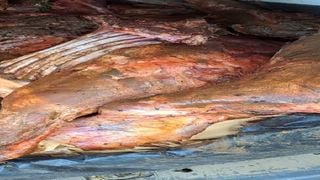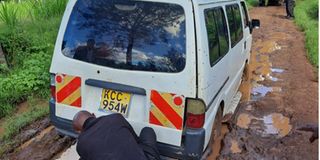
Part of the contraband meat from stolen donkeys seized by police in Murang'a on November 14, 2023. The meat was being transported to Nairobi.
| Mwangi Muiruri | Nation Media GroupMuranga
Premium
What meat is on your plate? Nairobians beware, it could be from stolen Murang’a donkeys
Security officials in Murang'a County on Tuesday warned that decomposing donkey meat could find its way into Nairobi butcheries after more than 70 stolen animals were slaughtered in Makuyu Division.
Murang'a South Deputy County Commissioner Gitonga Murungi said that one suspect was arrested in a sting operation at a farm in Makuyu and 3,000 kilogrammes of donkey meat seized.
However, some suspects escaped a police dragnet and made away with 2,000kg of donkey meat. The animals were slaughtered three days ago.
"Our intelligence teams on the ground tipped off the County Security Committee in the evening about the suspicious loading of meat into a van and a truck... We rushed to the area and intercepted the van but the truck driver escaped," said Mr Murungi.
Murang'a County Commissioner Patrick Mukuria told Nation.Africa that they have informed their counterparts in Nairobi and Kiambu counties to be on the lookout for the suspects.
“The meat is at various stages of decomposition. Let meat buyers be cautious,” the commissioner said.
If the meat finds its way to “nyama choma” and “mtura” joints, then it will be easy for unsuspecting customers to fall prey, he said.
Mr Murungi said that Makuyu residents had complained about the rampant theft of donkeys prompting security officials to launch a probe. Their efforts paid off when they received a tip-off that led to the raid.
The raid comes two weeks after security agencies in Murang'a together with their counterparts in Kiambu County busted a Sh1.8 billion livestock theft cartel operating in Central region.
The security officials said they have established that powerful individuals are funding thugs who steal cattle in Kiambu, Murang'a, Kirinyaga and Embu counties and deliver the animals to slaughterhouses in Murang'a.
The breakthrough came on October 28 when police officers raided Kabati abattoir in Kandara Constituency and recovered 15 cows that had been stolen the night before.
“The cows had been stolen from Mwalimu farm in Ruiru Sub-County and our investigations led us to Kabati abattoir. We mobilised a team of detectives from Kenol, Kabati, Ruiru and Kandara and conducted a raid. We found that three cows had already been slaughtered, but we recovered the others," Murang'a County Police Commander Mathiu Kainga said.
"We were alerted by Ruiru Sub-County Police Commander Alexander Shikondi and we moved in fast and recovered the animals.”
Mr Kainga said the entire management of the abattoir and three other suspects were arrested.

A vehicle that was intercepted while transporting donkey meat to Nairobi on November 14, 2023.
"We are on the right track. We have gathered enough logistical intelligence against the cartel... We are now thoroughly informed on how these economic saboteurs operate and we will implement a joint action plan that will keep them out of business," he said.
Mr Shikondi said investigations in his area showed that dairy farmers were the worst affected by the livestock thieves.
“Even pregnant cows are being stolen. This is bad for the dairy sector which employs thousands of people. We have laid traps for the criminals and we will not rest until we wipe out the cartel. It appears there is a well-connected criminal enterprise with a huge budget,” Mr Shikondi said.
“It looks like the criminals are being informed about our operations, but we are a step ahead. We have adopted more creative tactics by recruiting informants in the transport sector and private security guards along major roads. The operation is successful.
"We have established that the cartel has spies on the ground who go to people’s homes to find out if they have cattle. The cartel also has a transport network, particular abattoirs where the animals are slaughtered and a ready market. The meat is stamped as certified for human consumption.”
According to an intelligence report submitted to the Central Region Security Committee on October 30, the cartel involves the theft of cattle, pigs and donkeys which are then slaughtered in registered abattoirs to conceal the crime.
The report suggests that the cartel may be working in cohorts with corrupt security officials who are paid to look the other way as the unscrupulous traders and gangs go about their business with impunity.
"There is need to audit ourselves and plug the loopholes that could sabotage our efforts from within. It is imperative that we audit our honesty right from the sub-location level to the traffic gatekeepers... the whole route that the stolen livestock goes through to end up as meat," the report says.
It also states that the region's economy loses an average of Sh5 million daily, calculated on the average loss of about 170 animals daily from Murang'a, Nyeri, Kirinyaga, Kiambu and Nyandarua — the counties that make up Central region as well as Machakos and Embu counties in Eastern Region.
"This is a criminal enterprise that involves animals worth about Sh5 million on a daily basis which are transported at night and slaughtered early in the morning and the meat transported to various market points in Nairobi, Rift Valley, Eastern and Central regions," reads the report to Central Region Commissioner Fred Shisia.
The report shows that cattle theft in the region accounts for 70 percent of general crime reported in the region.
In July this year, Mr Shisia had advised all area security committees to come up with a strategy to curb rising livestock theft. He said families were losing their livelihoods as dairy cows and pigs were being stolen.
A similar regional intelligence report made in May 2021 showed that of the 72 arrests made in the previous six months of compilation, 29 suspects were profiled as being from neighbouring countries.
The then Regional Commissioner Wilfred Nyagwanga, said the nature of the cartel and the people arrested gave credence to claims of a wider criminal network being behind the cases of cattle rustling in the region.
"Investigations are ongoing, and we have a lot to deal with. Foreigners have gained entry into our region, blended into the community and established a criminal network," he said.
The report tabulated the cartel's profits as 10 per cent for village gangs, 20 percent for transporters who used vans and motorcycles, and 30 percent for corrupt policemen offering protection.
Ten percent was allocated for logistics, which involves renting slaughterhouses and hiring slaughter men.
"This guaranteed a profit of 30 per cent for the kingpins and the profit went higher as they also sold hides," the report states.
On June 12, 2019, the then Interior Cabinet Secretary Dr Fred Matiang'i issued a directive that all unlisted foreigners in the country should be rounded up and deported, but to date they continue to roam freely in many parts of Mt Kenya region, compromising the security of the area.
"We are studying the provisions of the East African Cooperation Treaty on integration... It is true that some of the suspects in this cartel are from Tanzania. Once we have the names of their employers, who are Kenyan citizens, we will know the right course of action to take in court," Mr Shikondi said.
Mr Shisia said that in every crime there is someone with information that can help the investigation, hence he is mobilising all well-meaning residents to share information with the security agencies.
"We know that members of the public fear for their lives if the information they share with us is mishandled. We have an anonymous toll-free number 988 where they can give us information," he said.
Mr Shisia said that the report should start with the name of the county followed by the tip.
"Once sent, the text will be immediately be forwarded to five security chiefs in your county, namely; the county commissioner, the county police commander, the county coordinating/county administration police commander, the county criminal investigation officer and the National Intelligence Service," he said.





